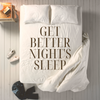
Top 4 Reasons Why Your Sleep May Be Suffering
, by Paul Walker, 3 min reading time

, by Paul Walker, 3 min reading time
Sleep is a cornerstone of good health, yet many people struggle to get the rest they need. If you find yourself tossing and turning at night, waking up feeling tired, or unable to fall asleep in the first place, you’re not alone. Understanding the root causes of poor sleep is the first step toward reclaiming your rest. Here are the top four reasons why your sleep might be suffering.
One of the most common culprits behind sleepless nights is stress. Whether it’s work deadlines, financial concerns, or personal relationships, stress activates your body’s fight-or-flight response. This increases levels of cortisol, a hormone that can make it difficult to relax and fall asleep.
How it affects sleep:
Tips to improve:
Your sleep environment plays a huge role in how well you rest. A room that’s too bright, noisy, or uncomfortable can disrupt your ability to relax and drift off.
Key issues include:
Tips to improve:
Certain lifestyle choices can have a profound impact on your ability to sleep. Factors like late-night snacking, caffeine intake, or an inconsistent schedule can throw off your circadian rhythm.
Common culprits include:
Tips to improve:
Sometimes, poor sleep is a symptom of an underlying health condition. Sleep disorders like insomnia, sleep apnea, or restless legs syndrome can interfere with your ability to get restorative rest. Additionally, conditions such as chronic pain, depression, or hormonal imbalances (e.g., menopause) can also play a role.
Signs to watch for:
Tips to improve:
If your sleep is suffering, it’s important to identify and address the root cause. Stress, poor sleep environments, unhealthy habits, and health conditions are common culprits, but small changes can make a big difference. By prioritizing rest and making adjustments to your routine, you can set yourself up for better sleep—and better overall health.